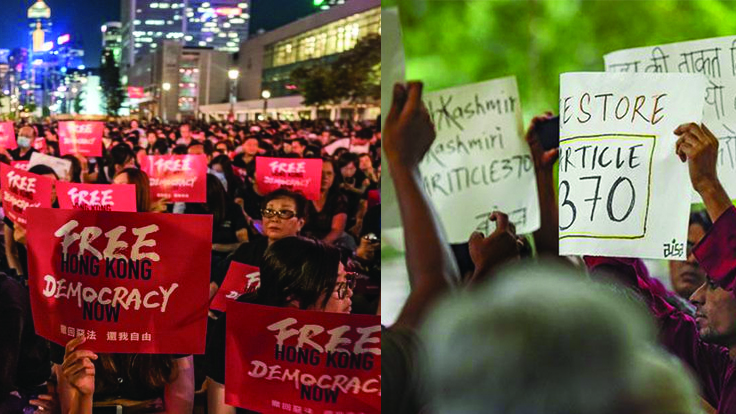Dhanada Kanta Mishra
The protests for democracy in Hong Kong have taken a turn for the worse. Both protesters and the government have hardened their stance, and Beijing is keeping a close eye on the situation as the 70th national day (October 1) approaches. China’s People’s Army is waiting in their garrisons to intervene in case the protests get out of control.
Hong Kong has a character unlike any other. This region was sparsely inhabited by fishermen and was mostly known for salt-making with a population of just over 7,000 in 1842. The Chinese had considered the cluster of islands and the region adjoining the mainland, dominated by steep hilly terrain, to be useless. But thanks to its strategic location, deep harbour and the industrious nature of people from China and around the world, Hong Kong today is a world-leading city. Its reputation of being the most prosperous city with the freest financial markets, easiest business environment, and a culture of innovation, among other things, make it unique. Over seven million people live in the city that is no bigger than greater Bhubaneswar.
Hong Kong dazzles with its skyline, swanky malls, consumerist lifestyle and the best from around the world on offer for a price. The society, however, is very much rooted in eastern culture. Discipline, hard work, strong family values, affinity with one’s culture and tradition, mostly Christian and traditional Chinese religious values make the societal ambience very different from typical western societies.
The majority by far are Hongkongers of Chinese origin who migrated from mainland China through the Nineteenth century and later the communist regime. Given the liberal mindset of a British legacy, Hongkongers value their freedom and liberty more than anything else. Right from the early Eighties, when Margaret Thatcher agreed with Deng Xiaoping to transfer Hong Kong back to the mainland’s control starting 1998, the residents have been greatly concerned about their future. The ‘one country-two systems’ arrangement which provides Hong Kong with safeguards such as its own constitution, flag and substantial autonomy until 2047 addressed those misgivings to a large extent. However, subsequent interference from Beijing has resulted in major protests from time to time.
In 2003, a major agitation forced the local government to withdraw its plan to frame rules to implement Article 23 of the basic law, defining what would be considered treason and secession. The fear was that it will be used to target political dissent. The imposition of Mandarin as opposed to the local Cantonese, the study of Chinese history in schools and dissatisfaction with the way the Chief Executive was to be elected had led to massive protests in 2014. The current protests stem from the proposal to change extradition law that would allow Hong Kong to extradite persons accused of crimes committed in Taiwan and mainland China. While the Bill is dead for all practical purposes, Chief Executive Carrie Lam’s refusal to entertain any demand of the protesters has led to a protracted stand-off. It is a classic case where non-violent agitations are forced into becoming violent owing to the indifference of authorities.
Both sides have become obstinate and are sticking to their guns. Chinese culture doesn’t allow even a perception of a ‘loss of face’ and any concession from China could have a domino effect in regions such as Tibet and Macao. As China negotiates with the US for a trade pact under erratic Trump, it is easy for it to believe that the protests are the handiwork of Uncle Sam. A massive propaganda campaign by the central government ensures that the general population of the country is firmly behind the authorities and favours strong-arm tactics. It is the typical David versus Goliath battle and no one knows how it will end.
Kashmir, in turn, has a history that dates back many centuries and its troubled past has seen many twists and turns along with senseless and bloody violence. Like Hong Kong, it has had a special arrangement via the instrument of accession signed by Maharaja Hari Singh at the time of Independence, which was formalised through Article 370 of the Constitution. Making article 370 infructuous in the manner it was on August 5 has raised a thousand questions on the constitutional, legal, moral and human dimensions of the matter. Today Kashmir has been locked down and its seven million people are cut off from the outer world.
Its political leaders are under detention and media has limited access to the state; Kashmir has become what one would have expected in a communist regime such as that in China. By sharp contrast, as bad as it may look, the situation in Hong Kong is more like a prosperous Indian state under its typical chaotic cacophonous democracy. It appears a vast majority of Indians on social media are unable to see the foolhardiness of the measure taken by the current dispensation. Those who are silent, are too occupied with day-to-day life as the economy tanks to even notice, let alone rejoice. Today, the silence of the Kashmiris is like the quiet before the storm, though. Maybe the decision to abrogate Article 370 will prove to be the government’s undoing and save India from other disasters in waiting such as the Ram Mandir in Ayodhya and the establishment of a “Hindu rashtra”. But the cost may already have been too high, and the wounds too deep.
Dhanada Kanta Mishra has a PhD in civil engineering from the University of Michigan and is a professor and Principal of KMBB College of Engineering and Technology. He is currently visiting the Hong Kong University of Science and Technology as a Research Scholar.
